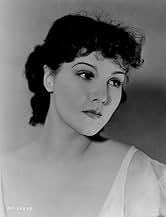Hannah is so tight with her money that she takes her son, Donnie, to the charity ward a week after he hurts his leg. But she has always hoarded her money since her late husband wasted most o... Read allHannah is so tight with her money that she takes her son, Donnie, to the charity ward a week after he hurts his leg. But she has always hoarded her money since her late husband wasted most of it and now she plans to save it for Donnie. But when Donnie graduates from Princeton, he... Read allHannah is so tight with her money that she takes her son, Donnie, to the charity ward a week after he hurts his leg. But she has always hoarded her money since her late husband wasted most of it and now she plans to save it for Donnie. But when Donnie graduates from Princeton, he does not want to go into banking at Hannah's bank, he wants to be a writer, which upsets ... Read all
- Bank Clerk
- (uncredited)
- Miss Austin - Burton's Secretary
- (uncredited)
- Train Conductor
- (uncredited)
- Train Vendor
- (uncredited)
- Betsy - Kate's Maid
- (uncredited)
- Thomas - Bank Messenger
- (uncredited)
- Committee Man
- (uncredited)
- Woman at Graduation
- (uncredited)
Featured reviews
In truth, Mrs. Green was a monstrously greedy character who, if she did not sell tainted pork to the Union Army, as did her fellow Robber Baron, Armour, did go to free clinics herself, rather than pay for medical treatment. She also forged her aunt's will and tried to bribe the judge in the case, but those are mere trifles in her story.
Almost inevitably, the writers soften her character, making her more sinned against than sinner in love, and the anonymous benefactress of scrubwomen and so forth. Doubtless people would have refused to see the real story, because there was no real story beyond a woman living a tough life, going head-to-head in the man's world of Wall Street and doing it well. Enough of a story for me, perhaps, but not enough to sell the studios.
The performances are sterling, and May Robson is having a lot of fun playing an out-and-out villainess, much as Edward Arnold would the next year, playing Jim Fisk, the man who precipitated the Panic of 1869. That's softened too. Still, actors love playing villain. They have fun, and the audience does, too. So have some fun and see this one.
Did you know
- TriviaAccording to a contemporary article in the Motion Picture Herald, May Robson's character is based on Hetty Green (1834-1916), known as "The Witch of Wall Street," because of her financial acuity and frugality. During her career she was the richest woman in the United States, and was also known as "The Queen of Wall Street." She also had a daughter, but just her son was portrayed in this film.
Hetty Green was born in 1834 in New Bedford, Massachusetts to the richest whaling family in the city with a Quaker upbringing. She learned business basics at the knee of her father and grandfather. At 13, she became the family's bookkeeper and later helped manage her family's business. She was "the richest woman in America" during the Gilded Age."
She was an early proponent of empowered women, believing "It is the duty of every woman to learn to take care of her own business affairs," and "A girl should be brought up as to be able to make her own living..." "Whether rich or poor, a young woman should know how a bank account works, understand the composition of mortgages and bonds, and know the value of interest and how it accumulates." She predicted the Panic of 1907, was a well-established financier and "was the only woman invited to the critical meeting with J.P. Morgan and the leading banking executives at the height of the crisis."
Despite Hetty Green's exceptional investment instincts, discreet generosity, and admirable character, most media reports from the era (and soon thereafter) characterized her thrift as evidence of miserliness. The Guinness Book of World Records named her the "greatest miser." Stories that were often cited include her refusal to buy expensive clothes, pay for hot water, instructing her laundress to wash only the dirtiest parts of her dresses (the hems) to save money on soap, and her habit of wearing a single dress that was only replaced when it was worn out. Yet many of these habits were considered abnormal mainly because the Gilded Age was a time of celebrating excess rather than hiding it. When Hetty Green's life is evaluated in its entirety and in the context of the time period, it is clear that media criticism grossly misrepresented her true character.
- GoofsOn the streetcar, the conductor removes the transfer tickets from his pocket twice between shots.
- Quotes
[last lines]
Mrs. Hannah Bell: Whose pneumonia is this? Yours or mine?
Details
- Release date
- Country of origin
- Languages
- Also known as
- Old Hannibal
- Filming locations
- Production companies
- See more company credits at IMDbPro
- Runtime1 hour 22 minutes
- Color
- Aspect ratio
- 1.37 : 1






























